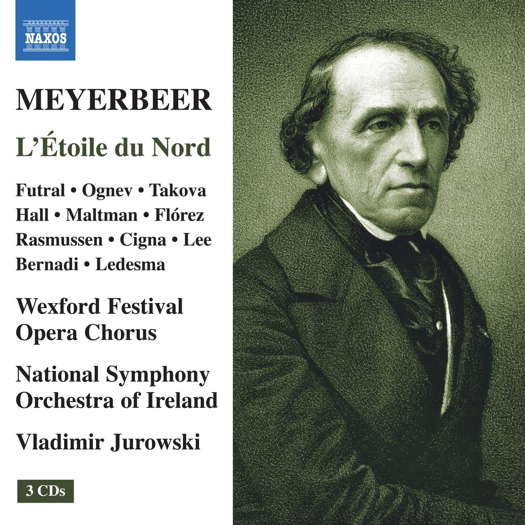 SPONSORED: CD Spotlight. Most Remarkable - Jamaican pianist Orrett Rhoden, heard by Bill Newman.
SPONSORED: CD Spotlight. Most Remarkable - Jamaican pianist Orrett Rhoden, heard by Bill Newman.
All sponsored features >>
- Victoria de los Ángeles
- American music
- Bob Auger
- Piazzolla: María de Buenos Aires
- Paul Spicer
- The Misty Morning
- Donald Fraser
- Jean Henry D'Anglebert
 DISCUSSION: What is a work? John Dante Prevedini leads a discussion about The performing artist as co-creator, including contributions from Halida Dinova, Yekaterina Lebedeva, Béla Hartmann, David Arditti and Stephen Francis Vasta.
DISCUSSION: What is a work? John Dante Prevedini leads a discussion about The performing artist as co-creator, including contributions from Halida Dinova, Yekaterina Lebedeva, Béla Hartmann, David Arditti and Stephen Francis Vasta.

Star of the North
GERALD FENECH strongly recommends Meyerbeer's 'L'Étoile du Nord' on Naxos
'Vladimir Jurowski conducts the piece with natural gusto and sparkling flair ...'
The German pianist and composer Giacomo Meyerbeer was born in Berlin on 5 September 1791, the year of Mozart's death. His prosperous family background ensured that he had the best of education. In music he studied with the famous Muzio Clementi and gave piano concerts up to the age of eleven, after which he went to study composition with Carl Zeller and Abbé Vogler in Darmstadt. It was during this period that he wrote his first two operas.
While in Vienna pursuing his career as a concert pianist he met the renowned Antonio Salieri, who advised him to go to Italy to study the singing voice. What was supposed to be a brief tour became a stay of nine years. While in Venice he fell under the spell of Rossini at a performance of Tancredi, and immediately began to write Italian operas. He composed six such works, of which Margherita d'Anjou (1820) and Il Crociato in Egitto (1824) are the best-known. Performances of these operas were given all over Italy, and these brought Meyerbeer universal acclaim.
He returned to Paris on the crest of the wave, and was soon commissioned to write a new opera. The result was Robert le Diable (1831) which turned out to be an absolute triumph. Following this success, Meyerbeer decided that Paris should be the centre of his operatic activities for the rest of his life.
Between 1842 and 1848 Meyerbeer was General Music Director in Berlin, where he was responsible for the staging of Richard Wagner's Rienzi (1847) and Der Fliegende Hollander (1848), an act of generosity that Wagner repaid with a great deal of spite, mocking the composer and other Jews in his venomous writings.
Meyerbeer returned to Paris in 1848 and there renewed work on Le Prophete, which had been completed in 1840 but withdrawn when the principal tenor fell out. When staged in 1849 it was a sensation. At the Opera alone, it ran for a hundred performances in only two years.
L'Africaine, his last uncompleted opera, was put aside, while the two operas-comiques, L'Etoile du Nord (1854) and Dinorah (1859) went into production. L'Africaine was taken up again in circa 1862, but with some diffidence, because the librettist Eugene Scribe had died in 1861. As the date for the production approached, Meyerbeer was getting more anxious about necessary alterations. It was perhaps because of the consequent worry and stress that Meyerbeer died suddenly in his sleep on the morning of 2 May 1864. Rossini, who not having heard the news came to his apartment to meet him, was shocked and fainted. He was moved to write on the spot a choral tribute: Pleur, pleur muse sublime.
When in 1843 the Berlin Opera House burned down, the creation of the new building gave a new opportunity for commissioning a new German opera from Meyerbeer. The subject of the opera, Ein Feldlager in Schlesian (A Silesian Encampment) was an episode in the life of Frederick the Great. The piece, though patriotic in nature, was a total failure, and the music was quickly forgotten. Maybe this was providential, as L'Etoile du Nord has its genesis in Ein Feldlager in Schlesian. Indeed, the essentials of the story and even a portion of the music found their way into the former.
Very briefly back to L'Africaine. This last unfinished masterpiece by the composer was eventually premiered on 28 April 1865 in a performing edition by François-Joseph Fetis. It had a moderate success and has never commanded a regular place in the repertoire, but revivals in recent times have confirmed its true greatness both in scope and musical invention.
L'Etoile du Nord was premiered on 16 February 1854 at the Opera-Comique. Coming so soon after the immense success of Le Prophete, this first attempt at the opera-comique genre turned out to be another huge hit, and within a year, it had already received a hundred performances at the Opera-Comique alone. Unfortunately, today this work is the least performed of Meyerbeer's Paris operas.
Listen — Meyerbeer: De quelle ville es-tu? (L'Étoile du Nord Act I)
(8.660498500 CD1 track 13, 0:01-0:49) ℗ 1997 Naxos Rights US Inc :
The plot unfolds in Finland and St Petersburg during the reign of Peter the Great at around 1710. Catherine is a Finnish peasant girl who misses her dead mother a great deal. She is also the sister of George, who ends up being drafted into Peter the Great's army along with Danilowitz, a pastry chef. Catherine wants to help her brother evade this conscription, as he is engaged to the beautiful Prascovia and is about to get married. She disguises herself as a boy and takes his place. In the meantime, the Tsar is in love with Catherine, and to win her hand he disguises himself as a carpenter. When they meet, both disguised, she in turn falls in love with Peter, but she still does not know who he really is. After revealing his identity, the Tsar succeeds in winning Catherine's hand. She marries him and becomes Empress of all Russia after previously foiling an attempted coup against her future husband. These are the bare essentials of the story, but as is the wont with such operas, the goings on are much more profuse and complicated. Still, I do not think we need to go into all that.
This 'Star of the North' is a peculiar mixture of village wooing and military life, and this gave Meyerbeer the opportunity for writing and piecing together highly coloured numbers, mainly ensembles and choruses, a cavalry chorus, one for the infantry with the singers imitating drum-rolls, and another for conspirators against the Tsar, marches, fanfares and so on.
Listen — Meyerbeer: La Marche sacrée (L'Étoile du Nord Act II)
(8.660498500 CD2 track 13, 0:26-1:18) ℗ 1997 Naxos Rights US Inc :
The opera is also filled with the use of rhythm, harmony and, most of all, inventive orchestration, a feature that intrigued Berlioz. All of this contributed to L'Etoile du Nord's sound world being more remarkable than the composer's earlier stage-works. This is a work of great originality and charm full of lovely melodic passages, thrilling choruses and memorable arias.
Listen — Meyerbeer: Fusilée (L'Étoile du Nord Act III)
(8.660498500 CD3 track 6, 0:06-1:04) ℗ 1997 Naxos Rights US Inc :
Vladimir Jurowski conducts the piece with natural gusto and sparkling flair, making the music shine more brilliantly than the 'Star of the North' itself. Indeed, performances are wonderfully engrossing from start to finish.
Listen — Meyerbeer: Finale (L'Étoile du Nord Act III)
(8.660498500 CD3 track 8, 18:10-19:08) ℗ 1997 Naxos Rights US Inc :
This opera was recorded live in October 1996 at the Wexford Festival, and was later released as a three-CD set by Marco Polo, so all praise to Naxos for giving opera buffs a fresh opportunity to enjoy and assess anew a work full of light and delightful music from a composer who, of late, has fallen a bit by the wayside. Strongly recommended, even if sound quality is not what one expects.
Copyright © 24 May 2022
Gerald Fenech,
Gzira, Malta

CD INFORMATION - MEYERBEER: L'ETOILE DU NORD


